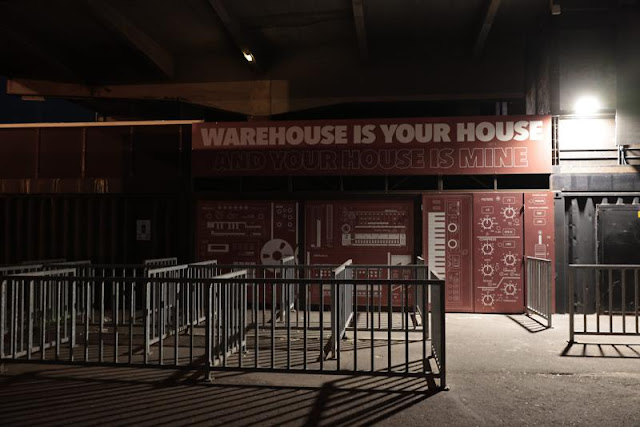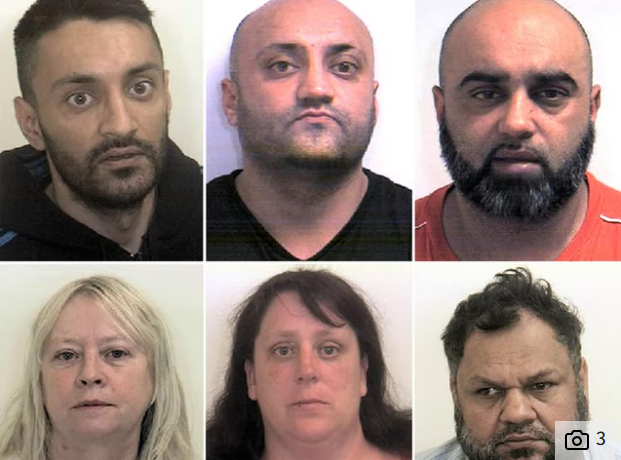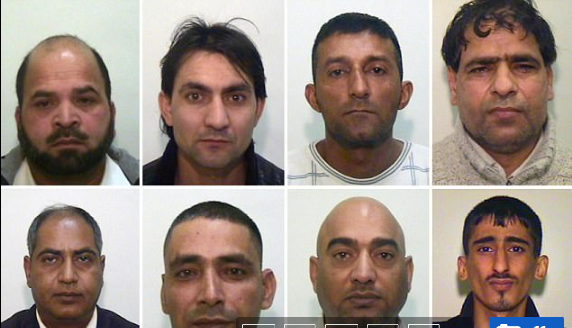..
Rotherham police dismissed child sex abuse as ‘typical teen behaviour’
damning report finds
Independent Office for Police Conduct found ‘systemic’ failings in the way
South Yorkshire Police dealt with sex exploitation
Chiara Giordano
7 hours ago
A damning report has revealed a catalogue of “systemic” police failures as child sexual exploitation in Rotherham was dismissed as “typical teenage behaviour”.
A total of 47 current and former officers were investigated by the Independent Office for Police Conduct (IOPC) after it was revealed at least 1,400 girls were abused, trafficked and groomed in the town between 1997 and 2013.
Virtually all of them by Pakistani Muslims! Devout Muslims believe that European girls who are not Muslim are all prostitutes and are therefore fair game.
The watchdog’s long-awaited report told of how teenagers were seen as “consenting” to their abuse by South Yorkshire Police (SYP) officers, who were told to prioritise other crimes such as burglary and vehicle crime.
One 13-year-old victim said she was told more than a dozen times that she was “responsible for [her] ‘behaviour’ for being sexually abused and exploited by several grown men”.
The survivor said officers had “adult expectations” of children despite their age and she was never treated as the vulnerable child she was.
The report included another incident when a parent concerned about their missing daughter was allegedly told by an officer “it was a ‘fashion accessory’ for girls in Rotherham to have an ‘older Asian boyfriend’ and that she would grow out of it”.
A research and development officer working on a crime reduction project about street prostitution claimed the police force was “dismissive” of child sexual abuse and exploitation (CSA/E) incidents and “regarded what was happening as a result of ‘typical teenage behaviour’”.
IOPC director-general Michael Lockwood said in the report: “We found that officers were not fully aware, or able to deal with, child sexual abuse and exploitation offences and showed insufficient empathy towards survivors who were vulnerable children and young people.
“We saw examples of SYP seeing children, and young people, as ‘consenting’ to their exploitation, and a police culture that did not always recognise survivors as victims, or understand that, often, neither did those being groomed or abused.”
Brothers Arshid Hussain, Basharat Hussain and Banaras Hussain and (left to right bottom) Karen MacGregor (left), Shelley Davies and Qurban Ali were sentenced to a combined 103 years in prison for their roles in the Rotherham grooming gang
(South Yorkshire Police/PA)
The police watchdog acknowledged the “significant changes” made since then to improve the way the force deals with this kind of offending.
However, it found SYP “failed to protect vulnerable children and young people” and had a small “overwhelmed” unit tackling child sexual exploitation which “was not ready to deal with the nature and scale of the problem in Rotherham”.
The report confirmed no officer lost their job despite 265 separate allegations made by 51 complainants, 44 of whom were survivors of abuse and exploitation.
Of the 47 officers investigated, eight were found to have a case to answer for misconduct and six had a case to answer for gross misconduct. Five of these officers received sanctions ranging from management action up to a final written warning.
A sixth faced a misconduct hearing arranged by the force earlier this year and the case was found not proven by the independent panel.
Of the 164 allegations the IOPC looked into where an officer’s conduct was not under investigation, the watchdog upheld 43 complaints.
In many cases, officers had retired and, due to legislation in place at the time, could not face disciplinary proceedings.
Sammy Woodhouse, a Rotherham abuse survivor, said she was “disgusted” nobody in the police force had been held accountable.
Rotherham abuse survivor Sammy Woodhouse is ‘disgusted’ nobody in the police has been held accountable.
(Dave Higgens/PA)
The 37-year-old campaigner, who was groomed and raped from the age of 14, told the Daily Mirror: “As per, not one person has been held to account for anything, despite all this evidence they have and they’ve retired and got full pensions.”
Ms Woodhouse said she had been “trying to have people held to account” during her 10-year campaign for justice “but has not been successful”.
Another survivor, who was abused from the age of 15, told the newspaper the outcome of the report was “an absolute joke”. “It’s sickening,” she said. “There’s no accountability.”
Steve Noonan, the IOPC’s director of major investigations, said: “Our report shows how SYP failed to protect vulnerable children and young people.
“Like other agencies in Rotherham at that time, it was simply not equipped to deal with the abuse and organised grooming of young girls on the scale we encountered.”
Of course, if it had been dealt with properly from the beginning, it would never have reached anywhere near that scale.
South Yorkshire’s police and crime commissioner Alan Billings said: “I am disappointed that after eight years of very costly investigations, this report fails to make any significant recommendations over and above what South Yorkshire Police have already accepted and implemented from previous investigations some years ago.
“It repeats what past reports and reviews have shown – that there was unacceptable practice between 1997 and 2013 – but fails to identify any individual accountability.
“As a result, it lets down victims and survivors.”
He said it was unfair officers have had allegations of misconduct “hanging over them for so long”, but said the force was now “on a path of continuous improvement”.
South Yorkshire’s deputy chief constable Tim Forber said the force “fully accepts” the report’s findings and admitted the police “let victims down”.
“We failed to recognise their vulnerability and failed to see them as victims, for that I am deeply sorry,” he said. “They deserved better from us.”
They still deserve better from you.
Rochdale grooming gang boss - known as 'Daddy'
- worked as ‘welfare officer’
By DAN SALES FOR MAILONLINE
PUBLISHED: 17:35 EDT, 20 June 2022
The notorious ringleader of a grooming gang portrayed in the BBC's Three Girls series was employed as a welfare rights officer by Oldham Council, a major report has revealed.
Shabir Ahmed, who led the sexual abuse ring in Rochdale and was nicknamed 'Daddy', was seconded to the Oldham Pakistani Community Centre during his time at the local authority.
Ahmed, identified only as 'Offender A' in the report, is now serving a 22-year jail sentence.
He was a sex predator and former taxi driver, and was described as the ‘ringleader’ of the nine-strong group found guilty of exploiting girls as young as 13 at Tasty Bites and another takeaway in Heywood from 2007.
Despite multiple concerns being raised about him and his arrest for the sexual assault of children, police failed to tell his employers.
Maggie Oliver, the former GMP detective who turned whistleblower, said: 'Another day, yet another report about the failures of a police force to protect the most vulnerable in our society, even when there is irrefutable evidence to prosecute offenders and safeguard children.
'This report yet again clearly evidences catastrophic failings by the force and their repeated attempts to cover up and hide these failings both from the victims and from the public they serve, and that is extremely worrying.'
Report also details how Shabir Ahmed, the ring-leader of a notorious grooming gang in Rochdale, was employed by Oldham Council as a welfare rights officer
Andy Burnham, Mayor of Greater Manchester, said: 'This report continues the process of shining a spotlight on past failures in Greater Manchester.
'There were serious failings and victims were let down, particularly Sophie.
'Whilst there was no evidence of a cover-up, we must not flinch from acknowledging shortcomings.'
'If this had happened, it may have potentially avoided the tragic abuse of other children…' the report states, citing 'serious multiple failures' by both GMP and the local authority.
It said although Greater Manchester Police received an allegation of child sex abuse against Shabir Ahmed in 2005, officers chose not to inform the council. The report added that if they had told the council 'it may have potentially avoided the tragic abuse of other children'.
Ahmed left his council role the following year, and in 2012 police informed the council of a further allegation which occurred while he was part of the welfare team.
However, the report said the case was ‘inexplicably closed...within a few days’. By then the former taxi driver – nicknamed ‘Daddy’ – had already been charged with sex offences, including two rapes.

The Rochdale abuse scandal: What happened?
The Rochdale scandal was finally exposed in 2012, when people learned that for years, authorities had been suppressing knowledge of abuse rings of primarily Pakistani men preying on primarily white teenage girls.
Young women were being raped by multiple men on a nightly basis, after being plied with gifts and alcohol.
Nine men were sentenced in 2012, and another nine in 2016. In 2012, the men were given sentences ranging from four to 19 years.
A jury at Liverpool Crown Court heard that girls would be given alcohol before being passed around for sex at two takeaways, the Balti House and Tasty Bites, in the Heywood area.
The police were accused by then MP Simon Danczuk of ignoring the cases because they were brought by working class girls.
Reports have estimated the number of girls abused over the course of the cover-up at 1,400, but some have said it could be as many as 2,000.
It's curious that they use the same numbers for Rochdale as for Rotherham. Rochdale is a suberb north of Manchester, and Rotherham is a suberb northeast of Sheffield. Rotherham, with a population of about 265,000 is policed by South Yorkshire. Rochdale has a population of about 212,000 and is policed by Greater Manchester. The two towns are about 50kms apart.
Top row left to right: Abdul Rauf, Hamid Safi, Mohammed Sajid and Abdul Aziz; Bottom row left to right: Abdul Qayyum, Adil Khan, Mohammed Amin and Kabeer Hassan
The men sentenced in 2012 included Mohammed Amin who was jailed for five years for sexual assaults and conspiracy to engage in sexual activity with a child.
Abdul Qayyum, known as 'Tiger' to his victims, was jailed for five years for conspiracy to engage in sexual activity with a child.
Adil Khan was convicted of trafficking and conspiracy to engage in sexual activity with a child. He was jailed for eight years.
Mohammed Sajid, who abused girls in a flat in the city, was jailed for 12 years after he was convicted of conspiracy, sexual activity with a child, rape and trafficking.
Abdul Rauf was jailed for six years after being convicted of trafficking and conspiracy to engage in sexual activity with a child. The court heard he had sex with one girl in his taxi 20 to 30 times.
Abdul Aziz was convicted of trafficking and conspiracy to engage in sexual activity with a child and jailed for nine years.
The youngest of the group, Kabeer Hassan, was 25 when the abuse happened. He was jailed for nine years for rape and conspiracy to engage in sexual activity with a child.
Hamid Safi was jailed for four years for trafficking and conspiracy but was cleared of rape charges.
The ringleader Shabir Ahmed, was jailed for 22 years, for rape, sexual assault, trafficking and conspiracy to engage in sexual activity with a child.
Zoe and Amber, in episode one of Three Girls. The show divided viewers and some turned off,
finding it too hard to watch
Allegations had been brought to police on multiple occasions between 2008 and 2010, and after reviews following the court case, Greater Manchester Police apologised in 2015.
In total, 13 officers were investigated and seven were given misconduct notices, but none faced further proceedings after the report was issued.
After the report, Assistant Chief Constable, Dawn Copley said: 'I want to say we openly acknowledge that mistakes were made and victims were let down.
'For our part in that we apologise to the victims and we give them our assurance that lessons have been learned, changes have been made and we are determined to use this to continue making improvements.'
In April last year, 10 men were jailed for a total of more than 125 years for sexual offences against eight girls and women in Rochdale.
They included Afraz Ahmed, a former bus driver who picked up two of his young victims from school and offered them free tickets.
He was originally questioned in 2006 but a decision was made not to prosecute him after he claimed the girls' complaints against him were racially motivated.
Balti House, one of the Rochdale kebab houses where abuse took place, which is now under new management
Former bus driver Ahmed, of Rochdale, was found guilty of various sexual offences, including rape, conspiracy to rape and sexual activity with a child, in relation to five underage victims. He was jailed for 25 years.
Also sent to prison were Choudry Hussein for 19 years in his absence for rape, sexual activity with a child and conspiracy to rape.
Rehan Ali, of Blackley, was imprisoned for seven years and Kutab Miah, of Rochdale, for nine years after both were found guilty of rape and sexual activity with a child.
Abid Khan, of Liverpool, was jailed for six-and-a-half years and Mohammed Zahid, of Rochdale, for five years after both were found guilty of sexual activity with a child.
Mohammed Dauood, of Burnley, was jailed for 16 years after he was convicted of offences in relation to two victims including rape, sexual activity with a child and sexual assault.
David Law, of Ilkeston, Derbyshire, was jailed for 11 years after he was convicted of conspiracy to rape.
A tenth defendant, Mahfuz Rahman, of HMP Garth, pleaded guilty at an earlier hearing to three counts of sexual activity with a child. He was jailed for five-and-a-half years last September.
A then-40-year-old man, who cannot be named for legal reasons, was jailed for 23 years after he was convicted of rape and attempting to abduct a child in relation to three victims. He will serve an additional eight years on extended licence when he is released.
Nigerian senator & wife ‘tried to bring boy, 15, to Britain
to harvest his organs to give to their sick daughter’
Jemma Carr
18:55, 23 Jun 2022
Ike Ekweremadu, 60, a district senator, and wife Beatrice have been charged with trying to bring a child to the UK to harvest their organsCredit: Ekweremadu - Facebook
A NIGERIAN politician and his wife appeared in court today over charges of trafficking a teenager to the UK they found on the streets of Lagos to harvest his organs for their sick daughter.
Ike Ekweremadu, 60, a former deputy president of the Nigerian Senate, and Beatrice Nwanneka Ekweremadu, 55, are accused of trying to traffic the youngster to transplant his organs to their daughter who suffers from kidney failure.
The 15-year-old was allegedly given the passport of a 41-year-old in order to get into the UK and arrived in the capital in February.
But the teen had no idea he was there to donate a kidney until he went to a hospital appointment in London, a court heard today.
The husband and wife were both charged this morning with conspiracy to arrange or facilitate travel of another person with a view to exploitation, namely organ harvesting.
Appearing at Uxbridge Magistrates Court today, they spoke only to confirm their names, dates of birth and to tell the court clerk they live in Nigeria. Neither defendant entered any pleas to the charges.
The pair were arrested at Heathrow on Tuesday before boarding a flight to Turkey, the prosecutor added. Their passports have both been seized by authorities, the court heard.
Ike, who his lawyer said is a principle in a law firm that bears his name and a member of the Nigerian bar, is said to have had £20,000 on him on his arrest.
Damla Ayas, prosecuting, said the case was a unique one because the majority of the alleged offending took place in the UK but part of it is said to have taken place in their homeland of Nigeria. She said the Attorney General will need to make a decision within 14 days on whether they could charge them in the UK for all the alleged offences.
The court heard the couple, who have four children, have an address in Willesden, north west London, where their children live.
Ike, wearing a black jumper, and financial accountant Beatrice, wearing a black knitted cardigan with white stripes, both sat ashen-faced as the case against them was read out.
Lawyers Gavin Irwin, representing Ike and Antonia Gray, representing Beatrice, said their clients should be bailed under strict conditions but their application was refused.
The lawyers said both their clients denied the charges when interviewed by police.
Mr Irwin told the court: "He is a member of the Senate of Nigeria. "He previously had an even more senior role as the Deputy President of the Senate of Nigeria. He has led a blameless life as a public servant up until now."
Chair of the bench Lois Sheard told them: "These are serious allegations and this matter is now being adjourned to be listed on July 7 at this court."
The child has been cared for by safeguarding authorities and the Metropolitan Police.
The force added: "As criminal proceedings are now underway we will not be providing further details."
Sexual harassment at Australian mines 'shocking,' 'horrific,'
gov't report finds
By Thomas Maresca
A government inquiry released Thursday found "horrific" conditions of sexual harassment and assault for women workers at Western Australia mine sites. File Photo by Kim Christian/EPA-EFE
June 23 (UPI) -- Women working in Western Australia's mining sector are subject to "horrific" sexual harassment and abuse representing a "systematic" failure of industry and government oversight, a parliamentary report concluded Thursday.
A committee of state lawmakers released the report after a nearly yearlong inquiry triggered by numerous women filing police complaints.
"I knew horrific stories would be brought forward," Libby Lettam, chairwoman of the committee wrote in the report. "But I was shocked and appalled well beyond expectation by the size and depth of the problem."
Dozens of women shared their testimonies about conditions at Western Australia's mines, most of which operate under "fly-in, fly-out" systems, where workers stay for weeks at a time at remote sites.
One worker described being knocked unconscious in her on-site housing and waking up with her jeans and underpants around her ankles.
"I felt sick, ashamed, violated, dirty and very confused," she told the inquiry.
Another told the story of having a near-accident while driving a truck and being told by her supervisor that he would make the safety investigation "go away" if she had sex with him. She was also told she would have to "get on her knees" to be hired for a permanent job with the company.
The report described an environment of near-constant harassment and unwanted advances at the mining camps, as well as multiple incidents of stalking, offers of job advancement for sexual favors and violent assaults.
"I have been to about half a dozen sites, and I can truthfully state that I have been sexually harassed at every single one of them," one women said in her testimony.
A human rights study cited in the report found that 74% of women working in the mining industry reported being sexually harassed in the past five years. The report also pointed to a survey of Western Mine Workers' Alliance members that said 32% of women had received requests for sexual favors, and that 22% had the requests linked to working conditions or career advancement
Mining dominates Western Australia's economy, generating hundreds of billions of dollars a year for the massive, sparsely populated state from corporate giants including Rio Tinto, BHP and Fortescue Metals Group.
The inquiry called for sweeping changes throughout the industry, from on-site security and safety measures to a complete overhaul of reporting procedures and investigations among both companies and government agencies.
"It is completely inexcusable and simply shocking that this could be taking place in the 21st century in one of the state's most lucrative industries," Mettam wrote.
"This represents a failure of the industry to protect its workers and raises real questions about why the government was not better across this safety issue."









































